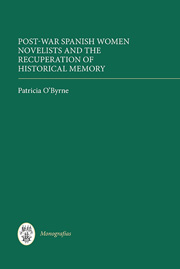Book contents
- Frontmatter
- Dedication
- Contents
- Acknowledgements
- Preface
- Introduction
- 1 Spanish Women Novelists 1940–1960
- 2 Work and Religion: a Right-wing Perspective
- 3 Sexual Abuse and Male Dominion
- 4 Spinsters in Post-war Spain
- 5 Exemplary Mothers and Sexually Liberated Women
- 6 Prostitution, Sexual Ignorance and Sex Outside Marriage
- Afterword
- Works Cited
- Index
2 - Work and Religion: a Right-wing Perspective
Published online by Cambridge University Press: 05 August 2014
- Frontmatter
- Dedication
- Contents
- Acknowledgements
- Preface
- Introduction
- 1 Spanish Women Novelists 1940–1960
- 2 Work and Religion: a Right-wing Perspective
- 3 Sexual Abuse and Male Dominion
- 4 Spinsters in Post-war Spain
- 5 Exemplary Mothers and Sexually Liberated Women
- 6 Prostitution, Sexual Ignorance and Sex Outside Marriage
- Afterword
- Works Cited
- Index
Summary
This chapter will consider the novels of Ángeles Villarta Tuñón (b. 1919), a writer with close associations with the Sección Femenina (Women's Section of the Spanish Falange), and examine how she communicates through her fiction the official discourse of the Sección Femenina, the regime, and the Church on the place of women in post-war Spain. The discussion will focus on her portrayal of the situation of working women and the role of religion in women's lives. However, before commenting on the author and her novels, the chapter will provide an overview of the Women's Section of the Falange. The Conclusion to each chapter is preceded by a commentary on the author's portrayal of marriage.
The Women's Section of the Spanish Falange
The Sección Femenina (SF) is undisputedly one of the most powerful twentieth-century women's organisations in the Western world. For many Spaniards, its memory remains fraught with tension, typifying the legacy of the deep political divides of the Civil War and Francoism. According to Encarnación Jiménez, the organisation grew from its initial seven founding members in 1934, consisting of Pilar Primo de Rivera and six university colleagues, to a point where it ideologically controlled 90% of the female population of Spain. In 1937 it became compulsory for all Spanish women to undertake Servicio Social (Social Service), which consisted of three months of taught programmes, including home-making, dressmaking, nutrition, childcare, hygiene, physical education and Falange ideology; and a further three months of community work such as assisting in hospitals or orphanages.
- Type
- Chapter
- Information
- Publisher: Boydell & BrewerPrint publication year: 2014

